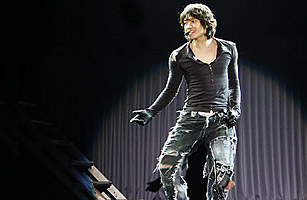
Rain is big — big! — in Japan. The South Korean king of pop also fills seats in Beijing, Pusan and Bangkok. In Hong Kong his concerts sell out in 10 minutes, and across much of Asia, fans snap up pirated videos of his soap operas. Thanks to his angelic face, killer bod and Justin Timber-like dance moves, Rain, 23, has ridden the crest of hallyu, or the Korean wave, the Asia-wide obsession for that country's pop culture. But the ambition that lifted Rain (real name: Ji Hoon Jung) out of a one-room house in Seoul won't be sated by simply conquering the biggest continent on earth. Rain is looking east to the U.S., studying English day and night. He sold out two shows at Madison Square Garden's smaller venue in February, and that could be just a few drops of the deluge that some think will follow the release of his English-language debut album this fall. Yet even if Rain, whose style virtually clones American pop, fails to make it in the U.S., the trend he represents is here to stay. Rain is the face — and well-muscled torso — of pop globalism. Before he visited the U.S., Rain already had a fan base, thanks to Internet music sites, satellite TV and DVDs of his soap operas. Those are the same media that make it easier than ever for growing numbers of Americans to get their fix of Japanese anime, Bollywood films and Korean music — and vice versa. Pop culture no longer moves simply in a single direction, from the West to the rest of the world. Instead, it's a global swirl, no more constrained by borders than the weather. Rain, after all, falls on everyone.